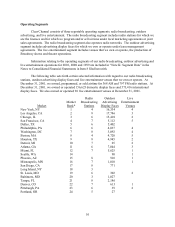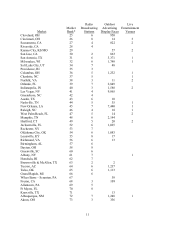iHeartMedia 2001 Annual Report Download - page 20
Download and view the complete annual report
Please find page 20 of the 2001 iHeartMedia annual report below. You can navigate through the pages in the report by either clicking on the pages listed below, or by using the keyword search tool below to find specific information within the annual report.
20
approve our acquisition based on the additional information submitted. Alternatively, the FCC may give
us the option of undergoing an administrative hearing or awaiting the outcome of the pending
rulemaking.
Recent court developments may have an impact on the FCC’s television ownership rules. In
February 2002, the U.S. Court of Appeals for the D.C. Circuit issued a decision requiring the FCC to
initiate further proceedings to justify its decision, as part of its initial biennial review, to retain the 35%
national television reach limitation. In the same decision, the court also vacated the FCC’s rule
prohibiting common ownership of a television station and a cable television system in the same market.
Additionally, the FCC’s local television ownership rule is the subject of a pending court appeal. We
cannot predict the impact of any of these developments on our business. Moreover, we cannot predict
the impact of future biennial reviews or any other agency or legislative initiatives upon the FCC’s
broadcast rules. Further, the 1996 Act’s relaxation of the FCC’s ownership rules has increased the level
of competition in many markets in which our stations are located.
Alien Ownership Restrictions
The Communications Act restricts the ability of foreign entities or individuals to own or hold
certain interests in broadcast licenses. Foreign governments, representatives of foreign governments, non-
U.S. citizens, representatives of non-U.S. citizens, and corporations or partnerships organized under the
laws of a foreign nation are barred from holding broadcast licenses. Non-U.S. citizens, collectively, may
own or vote up to twenty percent of the capital stock of a corporate licensee. A broadcast license may not
be granted to or held by any corporation that is controlled, directly or indirectly, by any other corporation
more than one-fourth of whose capital stock is owned or voted by non-U.S. citizens or their
representatives, by foreign governments or their representatives, or by non-U.S. corporations, if the FCC
finds that the public interest will be served by the refusal or revocation of such license. The FCC has
interpreted this provision of the Communications Act to require an affirmative public interest finding
before a broadcast license may be granted to or held by any such corporation, and the FCC has made
such an affirmative finding only in limited circumstances. Since we serve as a holding company for
subsidiaries that serve as licensees for our stations, we are effectively restricted from having more than
one-fourth of our stock owned or voted directly or indirectly by non-U.S. citizens or their representatives,
foreign governments, representatives of non-foreign governments, or foreign corporations.
Other Regulations Affecting Broadcast Stations
General. The FCC has significantly reduced its past regulation of broadcast stations, including
elimination of formal ascertainment requirements and guidelines concerning amounts of certain types of
programming and commercial matter that may be broadcast. There are, however, FCC rules and policies,
and rules and policies of other federal agencies, that regulate matters such as network-affiliate relations,
the ability of stations to obtain exclusive rights to air syndicated programming, cable and satellite
systems’ carriage of syndicated and network programming on distant stations, political advertising
practices, application procedures and other areas affecting the business or operations of broadcast
stations.
Public Interest Programming. Broadcasters are required to air programming addressing the needs
and interests of their communities of license, and to place “issues/programs lists” in their public
inspection files to provide their communities with information on the level of “public interest”
programming they air. In October 2000, the FCC commenced a proceeding seeking comment on whether
it should adopt a standardized form for reporting information on a station’s public interest programming
and whether it should require television broadcasters to post the new form - as well as all other
























